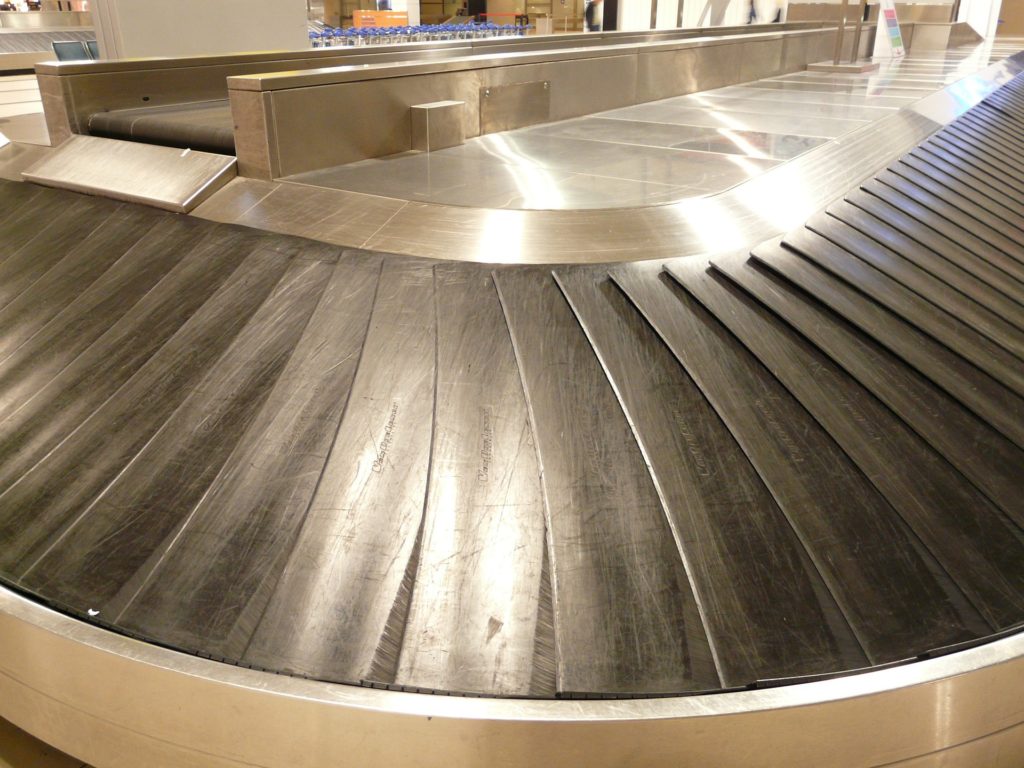
Lesson number two from my time in Italy: Things may not work out the way you wanted or expected, but hang in there – something will (probably) work out.
Mick Jagger, of course, said it better.
“You can’t always get what you want,
But if you try sometimes, you just might find,
You get what you need.”
My lesson came out of having to spend six hours trapped in Rome airport purgatory while waiting for a bag the airline had left in Frankfurt. Dazed and sleepless, I was slow to realize my bag hadn’t come. By the time I did, the line at the lost baggage window was forty people deep. The lone representative worked with tortoise-like diligence, reaching a record speed of about fifteen minutes per traveler.

A quick calculation suggested it would take five hours to get to me. That, unfortunately, proved true.
Miserable from no sleep, little food, and almost no water, I settled onto the floor. If I left the line, it was goodbye bag.
(Ironically, as it turned out, right after I filed the paperwork, my bag arrived.)
I would never have chosen to be part of such an event, but so it was. Everything brightened when I was released into the golden light of Umbria at dusk. The rest of my stay in Italy was great with views like this outside my room window.
You can’t always get what you want
It seems to me that Italians in general, are better at dealing with breakdowns than Americans. My Italian friends seemed to understand that sometimes you must wait for things to be fixed, figured out, or work themselves out. We Americans can be so comically righteous that things “should not be this way.”
God, or whoever runs the universe, clearly didn’t get the message about needing to meet our expectations.
In Italy, no one seemed particularly surprised about my baggage catastrophe. They thought it was too bad, but this was the summer of baggage handling nightmares in Europe.
“It’s all good” (or is it?)
Some friends of mine would say, “It’s all good,” and maybe, on a cosmic level, they’re right. However, there are times when I reserve the right to say, “It’s not all good.” For me, spending my first six hours in Italy on a concrete floor was not all good.
And I won’t say that suppressing women’s rights is good. It’s not. Or that a friend’s cancer is good.
Saying “It’s all good” is painting life with too broad a brushstroke.
Although there can be a benefit to positivity, such a generalization takes us off the hook for discerning and noticing the many facets of an event.

Looking for the good in our experiences is not the same thing as positive thinking. It requires a keen eye to tease out the many aspects inherent within a complex situation, and the multiple possibilities that may come out of it.
For example, it takes work to see any good coming from the suppression of women’s rights in the United States. However, I’ve read that American women are registering to vote in unprecedented numbers, so maybe some women are feeling the call to stand up for their rights and express themselves by voting–and that would be a good thing.
As another example, my friend with cancer would never ask to have her cancer. But within her life with cancer, she has found joy and deep learning.
Looking for the good in a situation doesn’t justify wrong or evil deeds or make light of tragedy and heartache.
It helps us recognize that in a complex world, storms and light co-exist together.

“But if you try sometimes, you just might find…”
I’ve heard it said that humans tend to see more of the negative or threatening aspects of life because noticing threats helped us survive.
Personally, I was over-endowed with a capacity to see what is negative or missing in any situation. I have to work twice as hard to discern what is good. For me, it’s like muscle training to be able to recognize small bits of good, joy, or benefit, especially when I don’t like a situation or feel disappointed.
To shift out of disappointed expectations requires effort.
We build our capacity to see the good when we pay attention to what is working (even if a lot isn’t). The broken pavement becomes a work of art.

It takes discernment and focus to find the good –– not wishful positive thinking.
Back to my baggage disaster
Here’s some good that came out of my nearly six hours on the airport floor.:
- I practiced self-control and found patience I didn’t know I had.
- I shared stories with a jolly group of people who were in line with me and discovered the surprising support strangers can give each other.
- I had empathy for the hoards of people across Europe who also lost their bags.
- I REALLY appreciated getting released from the airport and driving off into the Italian sunset.
- I survived and felt better the next day.
- I gained a good story.
All of this was real to me.
In the end, things worked out, and I was grateful. Italy was fantastic.
I learned that if you hang in there, things will probably work out and you can find good even in the difficult.
Which doesn’t mean I won’t think twice before checking my bag on another flight to Europe.
And now, on a lighter note:











